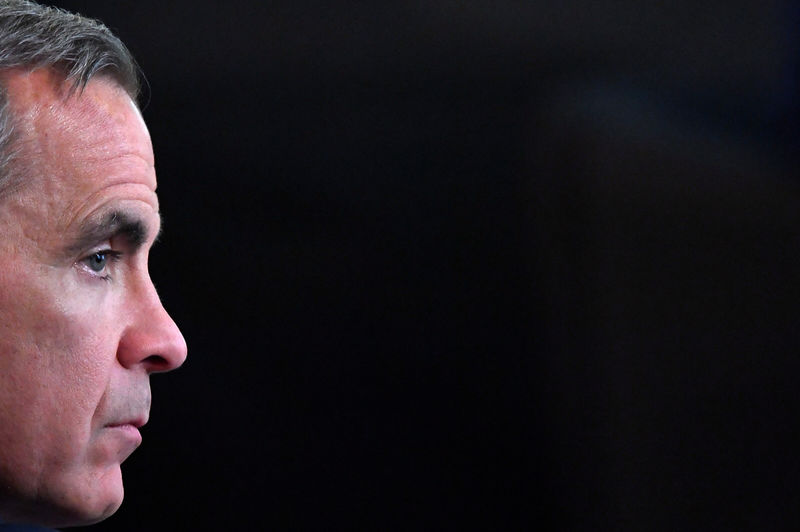 © Reuters. FILE PHOTO: The Governor of the Bank of England, Mark Carney, listens from the audience at an event at the Bank of England in the City of London
© Reuters. FILE PHOTO: The Governor of the Bank of England, Mark Carney, listens from the audience at an event at the Bank of England in the City of LondonBy Andy Bruce
LONDON (Reuters) – Signals that Britain’s economy is slowing suggest “unreliable boyfriend” Mark Carney — whose recent comments up-ended expectations the Bank of England would raise rates this month — may just be in touch with his data-sensitive side.
The BoE governor’s guidance on the path for interest rates has repeatedly been knocked off course by surprises in the economy, hence the accusation of unreliability from a lawmaker.
Carney’s highlighting last month of “mixed” economic signals shocked investors who had bet the BoE would raise rates to a new post-financial-crisis high of 0.75 percent on May 10.
Since then, almost all the gauges of Britain’s economy have disappointed. Financial markets now point to a less than 10 percent chance of a rate hike on Thursday, compared with 90 percent a month ago.
Britain’s economy barely grew in the first three months of 2018 and bad weather was not the only reason why, official statisticians said last month.
Below are some of the indicators that suggest the economy is struggling for momentum, probably reflecting a lack of clarity around Britain’s terms of departure from the European Union in less than a year, as well as a slowing euro zone economy.
BUSINESS SURVEYS
Business surveys last week showed the economy failed to bounce back as expected in April after being affected by heavy snow in March.
In fact, over the three months to April, the IHS Markit/CIPS index of activity in services companies — closely watched by members of the Monetary Policy Committee (MPC) — cooled to its lowest level since just after the Brexit vote in 2016.
The index now stands at levels that in the past have been consistent with interest rate cuts, not hikes.
“The lack of evidence so far of a rebound in growth – and the apparent slowdown in the jobs market – supports our view that there will be no further rate rises in the foreseeable future,” HSBC economist Elizabeth Martins said.
GRAPHIC: UK services PMI and Bank of England rates – https://reut.rs/2Ii6Dfv
DATA DISAPPOINTMENT
Late last year, a range of short-term economic indicators — which exclude the housing market, trade, government finances, producer prices and the unemployment rate — surprised consistently to the upside compared with the consensus of economists polled by Reuters.
But in 2018 these indicators have started to disappoint. By April, 22 out of 24 of these indicators came in worse than the Reuters poll consensus.
GRAPHIC: UK economic data start to disappoint – https://reut.rs/2JVgQvr
WAGES
An expected pickup in wage growth has long underpinned the BoE’s view that rates will need rise gradually over the next few years.
Carney said in February it was an “important point” that three-month annualized wage growth had been running above 3 percent for several months.
But the latest data show that wage growth on this measure slid to less than 1 percent in the three months to February.
Similarly, last September rate-setter Gertjan Vlieghe highlighted annualized wage growth in the private sector, excluding bonuses, as having averaged more than 3 percent over a five-month period. The latest data show this measure now stands barely over 2 percent.
Wage growth may not be picking up as BoE hoped: https://reut.rs/2JVeQTZ
INFLATION
Inflation over the first three months of 2018 came in at 2.7 percent year-on-year — weaker than the Bank of England’s forecast for 2.9 percent in its February outlook for the economy, as well as the Reuters poll consensus of 2.8 percent.
Surveys also point to a retrenchment of cost pressures in businesses and indicators of future wage growth have also soured a little of late.
Still, inflation remains well above the BoE’s 2 percent target.
GRAPHIC: UK inflation in Q1 2018 – https://reut.rs/2JVild3
INVESTMENT
Business investment has also disappointed — something Carney picked up on last month.
Overall, surveys do not show any real pick-up in investment intentions among businesses.
The Confederation of British Industry’s latest gauge of investment plans among smaller British manufacturers — a good guide to a BoE survey that MPC members favor — showed a sharp drop in spending plans for new equipment in the second quarter.
GRAPHIC: UK investment indicators – https://reut.rs/2JTbn8k
(Graphics by Andy Bruce; Editing by Catherine Evans)
Source: Investing.com




























